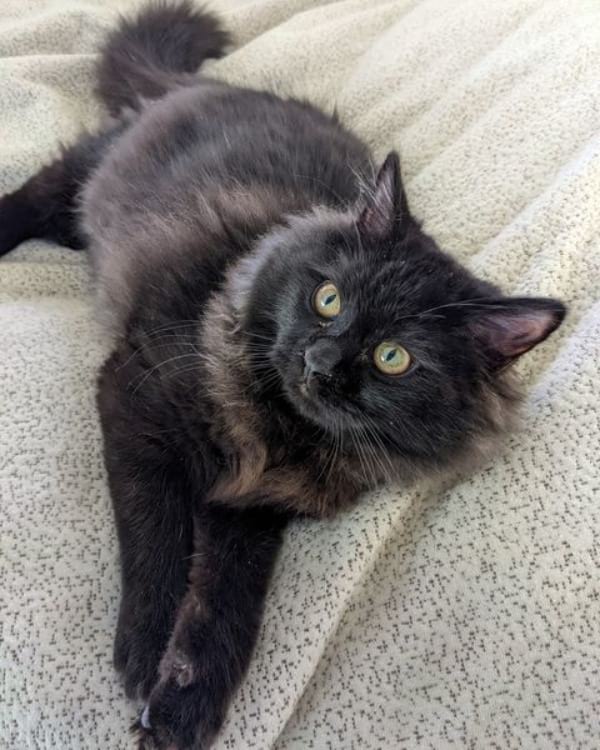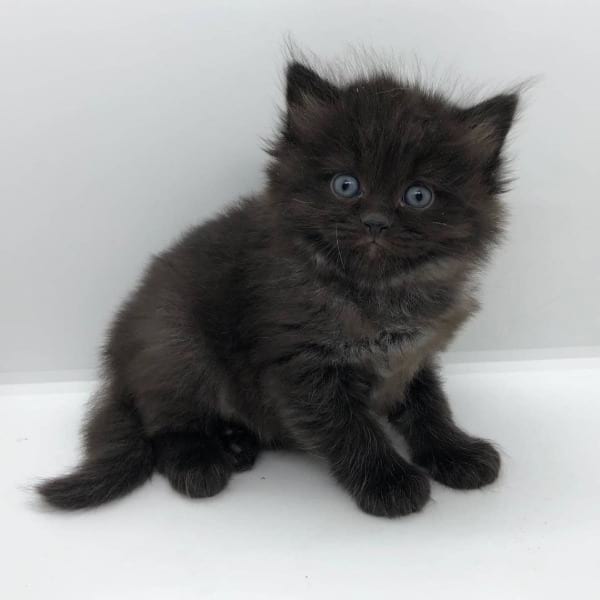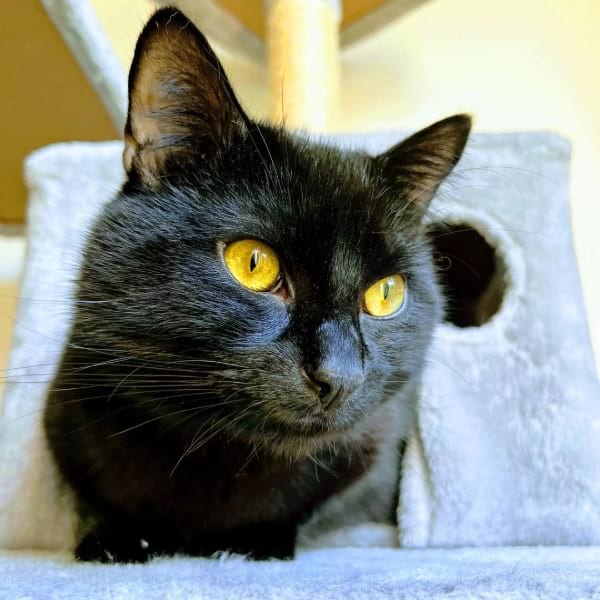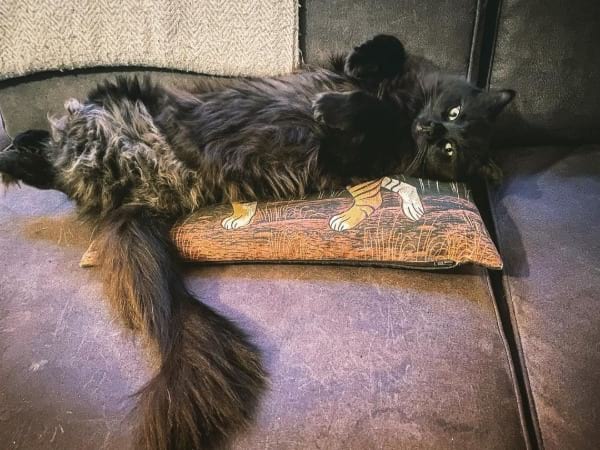The Ragdoll cat breed is one of the favorite feline prides worldwide. These bewhiskered buddies have extraordinary markings on their coats like masks, points on the tail, paws, and chest.
These cats are gentle, very calm, and really sociable.
And if most felines obtain light fur with brown, gray, and black color points, dark Ragdolls are far from widespread pet companions. But many cat lovers are crazy about this coat pattern.
So, Ragdoll kittens are on-demand today.
By the way, is it possible to expect a black kitten in the litter of two cat parents of usual coloration? Can you adopt a Ragdoll kitty locally without any challenges? Or is it difficult to pretend to be the black-colored fluffy baby of this breed?
Let’s find the answers together while diving into the topic of black Ragdoll cats.
Can Ragdolls Be Black?
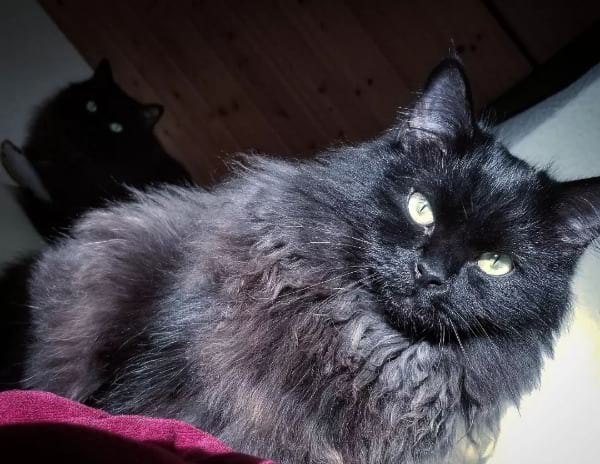
Each feline can perform a different set of genetic specifications, so the solid Ragdolls appear when both bewhiskered parents possess black genetic patterns. The baby with dominative unit factors responsible for the dark colors of its silky coat will be black (dark brown, gray, etc.) and non-pointed.
The Controversy Around Black Ragdolls
It is worth noting that most black Ragdoll cats are not permitted to take part in different feline exhibitions. Although these bewhiskered buddies are not lacking in the specific features of the breed (personality, behavior, socialization background), the absence of Ragdoll-specific coloration (non-pointed fur) impedes the process of solid kitties by experts and official associations including:
- ICA (International Cat Association);
- CFA (Cat Fanciers Association).
The more visible the combination of white and black color is, the more likely it is that this black bicolor Ragdoll will become the participant of the exhibit. Most feline exhibitions and contests still consider kitties with 95-99% of dark fur inappropriate attendants of all the local and worldwide competitions. This fact is extremely offensive for black Ragdoll cat breeders and owners.
3 Little-Known Facts About Black Ragdoll Cats
One curious fact about the worldwide denial in the context of black Ragdoll cats you have already read above. But there are other interesting ones to take into consideration:
- Almost every black Ragdoll cat has blue eyes. The length of fur, other appearance features together with the feline behavior do not differ from kitties with the traditional coloration (almost light with dark markings) or those who obtain black, brown, gray color points with an equal ratio to white (bicolor Ragdoll cats or black-mitted or with black tails and masks on the face, etc.).
- The Ragdoll breed is rather young. Having appeared in the 1960s due to Ann Baker, it has just been recognized around the world together with the peculiarities of solid coloration. In comparison with Ragdoll cats, the Maine Coon breed and other well-known ones were introduced in the 19th century.
- Most Ragdolls have dog-like personalities. They have a good memory, remember their owners (faces, smells, moves, voice), and socialize well with other pets (parrots, puppies, indoor cats, etc.). A cat lover who owns a black Ragdoll cat will confirm that all these characteristics are applicable for solid felines of this breed.
Worthy of separate attention is purchasing dark-colored/black Ragdolls. If most breeds are easily found locally for adoption and purchasing, you can face challenges with buying (check out our guides where to buy kittens in Florida, California, Pennsylvania, etc.). That is why one more exciting topic is Ragdoll cat breeding.
Black Ragdolls Variants
A Ragdoll can be black in a variety of ways. It might be entirely black from nose to tail with no white markings, it can have colorpoint patterns on its face and front legs while the rest of its body is black (this is termed a “seal”), or it can be any mix of the two.
Black Points
Their points will always be black, regardless of coat color.
Black Coat Color
Black coat color may be found in all Ragdoll patterns and hues, including seal, blue, chocolate, lilac point, as well as mitted or bi-color.
Black Smoke
Black smoke Ragdolls have a black-tipped coat with a light undercoat (white or cream).
Solid Black Ragdoll
A solid black Ragdoll cat is black from head to toe.
Black and White Ragdoll Cat
A black and white Ragdoll cat is often known as a tuxedo cat. They are usually black, but they feature white paws, a belly, and a throat.
Black Ragdoll Cat Health
A black Ragdoll cat is susceptible to any health issues that are typical in its parent breeds. Ragdoll owners should be aware of the following conditions:
- Hypertrophic Cardiomyopathy
- Eye issues
- Kidney failure
Black Ragdolls as Breeders
Buying a Ragdoll cat of dark coloration is not a very easy task. A black kitten appears only when the blend of required genes takes place. Even if both cat-parents are dark-colored, it is possible to have only pointed (seal-pointed, black-mitted, mask-pointed, etc.) in the litter.
At the same time, the probability to give birth to the black kitty when a cat-mother or cat-father is seal-pointed and another feline parent is non-pointed is high as well. If you are lucky to find the Ragdoll cat of your interest, be ready to pay for the kitty from $450 up to $2,500.
The cost depends on the breeder’s certification (including the DNA test undertaken), reputation, and other factors. If you are looking forward to becoming one of the breeders who offer solid Ragdolls, note that this is the game of chance. Most cats can be pointed in the litter.
Black Ragdolls as Pets
This is a fascinating breed with awesome felines who will become faithful pet companions. Ragdolls with black fur like kitties with the traditional Ragdoll points obtain an extremely docile personality with a significant social position.
They would like to contact people and other pets constantly. Loneliness is not part of the happy cat’s life when it comes to pointed kittens or adult felines, or non-pointed Ragdoll cats.
Speaking about their temperament and intelligence, you can count on a very clever pet with a calm and friendly character. In comparison with other cat breeds, solid Ragdolls are not about poor manners and aggression. But note that in addition to friendship and love, you should provide your pet with an extremely comfortable environment.
Take a closer look at the recommendations in the context of training, feeding, and care of your solid Ragdolls:
- Ragdoll cats (Ragdolls) are very active and playful. That is why you need to spend at least 2-3 hours a week training your beautiful pet with bright blue eyes. Buy toys (fetch balls, mouses, feathers, etc.) and play with your buddy.
- Most cat lovers name a Ragdoll cat as a dog-like animal. That is why you can teach your pet to perform different commands as well. For example, you can train your feline with an extremely silky coat texture to ask for treats (like ice cream or cake) or roll on the floor.
- A solid Ragdoll including a tuxedo cat or one with the W, T mask requires the same strict rules in nutrition to avoid different health issues like obesity, heart attacks, etc. It is recommended to feed your pet with canned or dry food approved by the vet (with a sufficient amount of proteins, fats, fiber, minerals, and vitamins).
Each reputable breeder also finds it important to mention that a Ragdoll cat is notable for its long coat and excessive shedding.
That is why grooming is a must for these pets. Brush the fur every week and visit the groomer at least every month. This way you will prevent various issues with the feline long hair (e.g. clotted fur).
How Much Does a Black Ragdoll Cost?
This is a popular breed in the cat world. The most reputable breeders ask between $2,000 and $2,500 per one Ragdoll cat black.
The lowest cost is about $450-$500. Some adoption centers and uncertified breeders can offer felines with black coloration, white patches, white paws, light stripes, and other black Ragdoll cat breed-specific features (including a tuxedo cat) for free.
But you should be the lucky one to find the dark Ragdoll-distinct feline cheaply or with no charge to pay. It is really difficult to find a blue bicolor Ragdoll, black mitted Ragdolls, and totally black ones in comparison with other cat breeds. Non-pointed kittens are a 100% discovery!
FAQ
Are black Ragdolls rare?
Black Ragdolls are still uncommon.
Why is a Black Ragdoll Cat not recognized as a purebred Ragdoll?
A Black Ragdoll Cat does not fit the typical patterns or colors that define how a Ragdoll must appear to be deemed purebred. Ragdolls must display pointed breed features, according to the recognized Ragdoll breed standard. Their body should be lighter than their points. A fully black Ragdoll’s coat is solid in color and so lacks this vital feature.
How Big Do Black Ragdoll Cats Get?
They are usually 9 – 11 inches tall and 17 – 21 inches long. Their weight is 10-20 pounds. Usually, males are bigger than females.
Final Word
A Ragdoll kitten can become a great pet companion with its wonderful temperament and aggression-free behavior. Especially if it is a black bewhiskered buddy with an exclusive appearance. Yes, dark-colored felines of this breed really exist.
But you will be the lucky one if you can adopt such a pet. Let non-pointed Ragdolls become your mascot. Take care of your lucky charm and love the feline with all your heart.
Table of Contents
